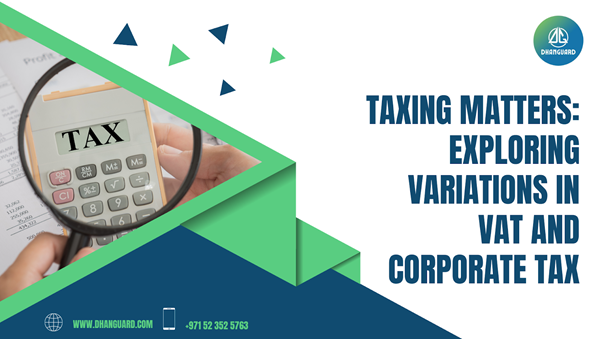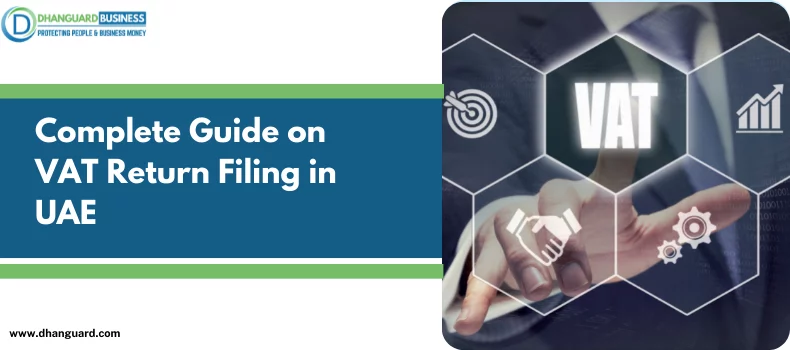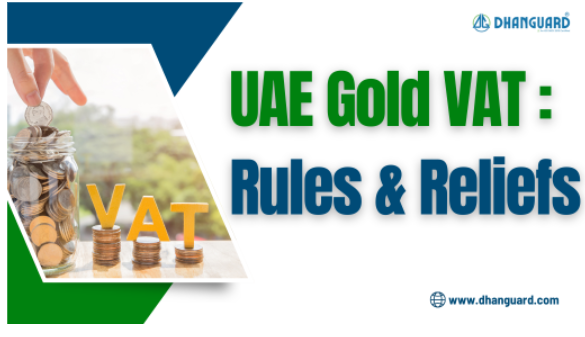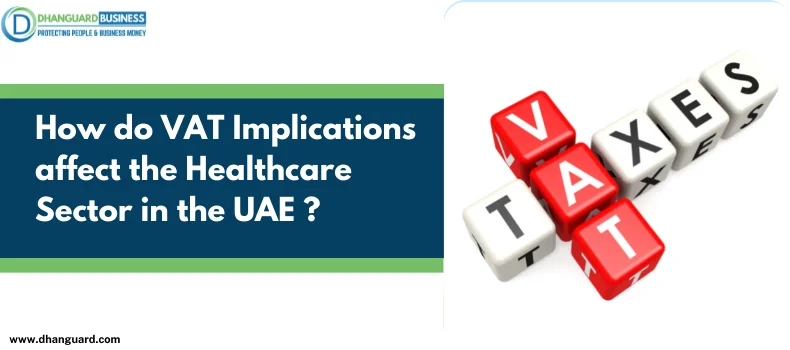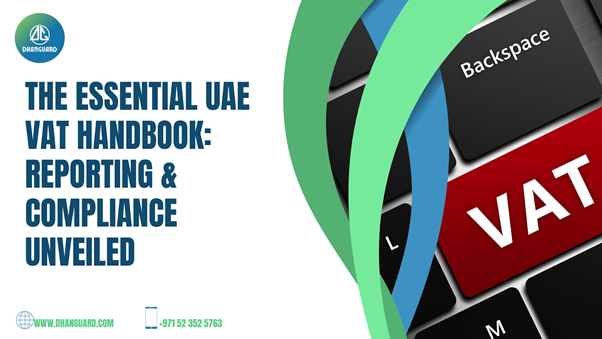In the landscape of taxation in the United Arab Emirates (UAE) for businesses, two significant components play pivotal roles: Value Added Tax (VAT) and Corporate Tax. Each holds distinct characteristics and implications; understanding them is vital for any business entity operating in the UAE in 2024. It is essential for any company doing business in the United Arab Emirates (UAE) to comprehend the tax environment. Value Tax (VAT) and Corporate Tax are key levies that firms must understand. The Federal Tax Authority (FTA) oversees both levies essential to the UAE economy. This blog will examine the main difference between corporate Tax and VAT in the United Arab Emirates, clarifying their objectives, ramifications, and methods for companies to comply with their duties. Dhanguard relieves your burdens by ensuring smooth Corporate tax compliance in Dubai. You may rely on us to handle the details and maintain your company compliant with taxes.
What is Value Added Tax (VAT)?
Value Added Tax, commonly known as VAT, is a consumption tax levied on goods and services at each stage of the supply chain. Introduced in the UAE in 2018, VAT aims to diversify the government's revenue sources and decrease reliance on oil revenue. VAT in the UAE is currently set at a standard rate of 5%.
Critical features of Value Added Tax (VAT):
Certainly! Value Added Tax (VAT) possesses several critical features, such as:
Multi-Stage Taxation
VAT is applied at every stage of the supply chain, from production to distribution to the final sale to the consumer.
Collected by Business
Businesses act as intermediaries in collecting VAT and remitting it to the government.
Input Tax Credit
Businesses can reclaim VAT paid on their inputs, reducing the tax liability on final goods or services.
Applicable to Most Goods and Services
While certain goods and services are exempt or zero-rated, VAT generally applies to a wide range of products and services.
Corporate Tax in UAE:
Corporate Tax is an income tax assessed on companies' profits. As of June 1, 2023, the Federal Tax Authority (FTA) of the United Arab Emirates (FTA) has passed legislation establishing corporate Tax. A decision has been reached to guarantee a varied and sustainable economy in the United Arab Emirates. The law states that starting with their first fiscal year beginning on or after June 1, 2023, a taxable person or business will be liable to a 9% corporate tax.
Characteristics of Corporate Tax in UAE:
Here are some further details about the characteristics of Corporate Tax in the UAE:
Emirate-Specific Regulations
Corporate tax laws can vary between different emirates in the UAE.
Industry-Specific Taxation
Some industries or businesses may be subject to corporate Tax while others remain exempt.
Taxation of Foreign Entities
Foreign entities operating in the UAE may be subject to corporate Tax based on specific criteria and regulations of the emirate.
Differences between VAT and Corporate Tax:
The nature of the Tax is the primary distinction between the two types of taxes. VAT is a consumption-based tax, while corporate Tax is a profit-based tax. While VAT is paid by consumers of the products and services they purchase, corporate Tax is imposed on businesses and paid by them.
While corporation tax in Dubai is based on profits, value-added Tax is computed by adding the value at each production stage. Businesses must submit taxes and pay corporate taxes on their earnings when it comes to corporate taxes; in the case of VAT, however, companies must charge VAT and send it to the FTA.
The critical distinctions between VAT and corporate Tax are summed up as follows:
Nature of Taxation
VAT is a consumption tax applicable at various stages of the supply chain, while corporate Tax is an income tax imposed on the profits of businesses.
Collection Mechanism
VAT is collected by businesses on behalf of the government, whereas corporate Tax is paid directly by companies on their earnings.
Scope of Application
VAT applies to a wide range of goods and services, whereas corporate Tax may be specific to certain industries or entities within an emirate.
Scope of VAT and Corporate Tax in the UAE
VAT affected companies in various industries, impacting the supply of goods and services. Businesses had to evaluate their operations, establish whether VAT was applied, and adjust pricing, invoicing, and accounting systems as needed. Corporate Tax, on the other hand, has a more focused and narrowly defined impact that primarily impacts businesses' financial statements and earnings.
Businesses had a heavy administrative load when VAT was introduced, especially in the beginning. Businesses had to set aside funds for staff training, VAT returns, and the installation of new accounting and reporting systems. Ongoing compliance increased the administrative burden, such as completing and paying VAT returns on time. In contrast, corporation tax may involve a different amount of continuous administrative burden than value-added taxation (VAT), even though it still requires meticulous tax planning and reporting. The corporation tax administrative load is lessened daily because there is no requirement for advance or interim payments to the tax authorities, and only one annual filing must be made nine months after the end of the financial year.
How can Dhanguard help you?
Dhanguard has offered its clients fantastic tax guidance and accounting and auditing services. Dhanguard can assist you in obtaining tax benefits and ensuring that your VAT returns are filed on time because of the knowledgeable staff of professionals who are well-versed in corporate and VAT tax legislation. With the help of the excellent staff at Dhanguard, you may prevent tax avoidance and the associated fines by receiving thorough tax advice. Understanding VAT and Corporate Tax variances is crucial for businesses to comply with tax regulations and plan their financial strategies effectively. While VAT operates as a consumption-based tax, corporate Tax, if applicable, directly impacts the profitability of a business. For further insights and specifics difference between VAT and corporate Tax in the UAE, consult with our experts at Dhanguard. Contact our team right now to learn more about our services.
DhanGuard: All-in-One Solution for Business Setup in Dubai, UAE
DhanGuard is your ultimate one-stop solution for all your business needs. Whether you’re planning to set up a new company or expand your existing business in the UAE, we’ve got you covered with our comprehensive range of services. From Business Setup in UAE and Company Formation in Dubai to managing your financial and legal compliance, we provide everything you need under one roof.
Our services include:
- Company Formation in UAE and Dubai
- Opening a Business Bank Account in UAE and Dubai with a 99% success rate
- VAT & Corporate Tax Compliance
- Accounting, Bookkeeping, and Auditing Services
- Trade License Renewal
- Golden Visa Assistance
Let DhanGuard make your journey of Business Setup in Dubai seamless and hassle-free!

